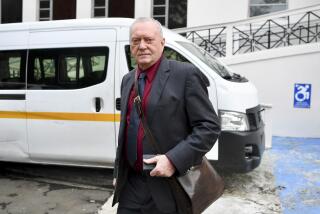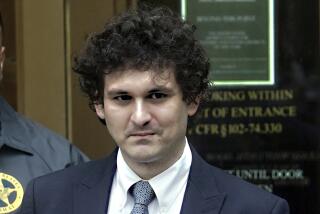Conviction of Key Wedtech Scandal Figure Overturned : Law: Court orders new trials for E. Robert Wallach and two associates on grounds that a witness lied.
- Share via
WASHINGTON — The 1989 conviction of California attorney E. Robert Wallach, a friend of former Atty. Gen. Edwin Meese III and a key figure in the Wedtech defense contracting scandal, was thrown out Friday by a federal appeals court on grounds that a prosecution witness committed perjury.
The convictions of two associates, W. Franklyn Chinn and R. Kent London, also were voided.
Wallach, 57, who had been facing a six-year prison sentence, was found guilty two years ago of fraud and racketeering by a federal court jury in New York for accepting payments from Wedtech in return for allegedly using his influence with Meese to steer government contracts to the firm.
Former executives of the Bronx-based company testified that they paid hundreds of thousands of dollars to politicians and consultants to help the small machine shop evolve into a sizable defense contractor with $400 million in federal contracts.
However, Anthony Guariglia, one of these executives, was later found to have committed perjury when he strongly denied charges by Wallach’s lawyers that he had gambled away certain company proceeds.
Although prosecutors and the judge contended after the trial that the gambling issue was unrelated to Wallach’s offenses, Guariglia eventually was charged and convicted of lying under oath. The appellate judges said that the perjury directly affected Wallach’s case.
In ordering a new trial for Wallach, the U.S. 2nd Circuit Court of Appeals in New York said that Guariglia’s perjury--had the jury known of it--might have affected his credibility as a prosecution witness.
“Had it been brought to the attention of the jury that Guariglia was lying . . . his entire testimony may have been rejected by the jury,” the appellate court said.
In a rebuke to the prosecutors, the court added: “Because we are convinced that the government should have known that Guariglia was committing perjury, all the convictions must be reversed.”
Wallach, reached for comment at his San Francisco office, said that he is “perfectly grateful to my friends in the profession who continued to believe in me. I always believed the system would ultimately correct its own abuses.”
He said that he would apply immediately for reinstatement of his California license to practice law, which was suspended after his August, 1989, conviction.
Wallach, who also had been assessed $675,000 in fines and forfeitures, as yet unpaid, said that he has been supporting himself on about $3,000 a month from work as a legal consultant.
A Justice Department spokesman said that the appellate court decision would be reviewed carefully before any decision is made on retrying Wallach, Chinn and London. Neither Chinn nor London could be reached for comment.
Chinn, of San Francisco, and London, of Honolulu, are financial consultants who prosecutors alleged helped Wallach conceal the purpose of his lobbying payments from Wedtech and assisted him in hiding the money in secret bank accounts, some of which were overseas.
Although the Wedtech scandal resulted in at least 16 convictions, including that of former Rep. Mario Biaggi (D-N.Y.), Friday’s action marks the third such reversal in Wedtech cases. The convictions of Lyn Nofziger, who was President Ronald Reagan’s White House communications director, and former Rep. Robert Garcia (D-N.Y.) previously were thrown out.
Biaggi and Garcia had been convicted on bribery and conspiracy charges for allegedly using their offices to help Wedtech win government contracts. Nofziger was convicted of violating the Ethics in Government Act, which prohibits federal officials from lobbying their former colleagues within the first year of their departure from the government.
Trial evidence showed that Wallach received $425,000 from Wedtech executives in return for his efforts to influence Meese, who served as White House counselor to Reagan before becoming attorney general. Meese testified that he merely had told White House subordinates to make sure Wedtech got “a fair hearing” on its requests for defense contracts.
Wallach received his payments from Wedtech under the guise of legal fees, but the government contended that the true purpose was to lobby Meese.
Meese was never charged with any wrongdoing.
Trial evidence showed that Wedtech obtained its first government work--a $32-million Army engine contract--without competitive bidding after an aide to Meese convened a White House meeting to put pressure on Army officials.
Meese, who testified as a defense witness, said that he never had shown Wallach favoritism, despite frequent contacts about Wedtech and other matters. The two men have been close since their days as law school classmates at UC Berkeley.
The firm plunged into bankruptcy in 1986 when it could not perform on a multimillion-dollar contract to produce portable bridges for the Navy.
Guariglia acknowledged at Wallach’s trial that he once had used company money for personal gambling, but he insisted that he had reformed--on orders from a federal bankruptcy court. He swore repeatedly that he had been following the court’s edicts to the letter.
Wallach’s lawyers uncovered records from casino pit bosses showing that Guariglia had gambled heavily on a trip to Puerto Rico--implying that he had lied to the jury and therefore was not a credible witness.
But prosecutors allowed Guariglia to deny the charges, and U.S. District Judge Richard Owen refused to permit the defense to call the casino pit bosses to cast further doubt on Guariglia’s testimony.
After the trial, prosecutors developed further evidence that Guariglia had lied about his gambling, and Guariglia was convicted last February.
Robert H. Bork, the conservative former appellate judge who was nominated but rejected for a seat on the Supreme Court, helped Wallach prepare his legal appeal without charging a fee, Wallach said. Bork long has believed that the federal racketeering statute under which Wallach was convicted is constitutionally flawed, but the appeals court did not base its reversal on that argument.
More to Read
Sign up for Essential California
The most important California stories and recommendations in your inbox every morning.
You may occasionally receive promotional content from the Los Angeles Times.










